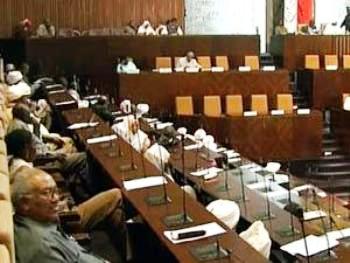Sudan parliament ratifies African pro-democracy charter despite opposition
May 6, 2013 (KHARTOUM) – Sudan’s national assembly has ratified the African Charter on Democracy, Elections, and Governance (ACDEG) despite opposition from some lawmakers who argued that the country might not be in a position to fully comply with its terms.

It was developed as part of the AU’s stated emphasis on promoting democracy and good governance in member states. It came into force on 15 February 2012.
The charter contains some provisions which allows the AU to intervene in the respective states to restore democracy.
MP Samia Habbani warned that the charter could be another “rope wrapped around Sudan’s neck”, while MP Ahmed Hassan Kambal stressed that signing the charter into law requires the country to have a “clean” human rights record which does not apply to Sudan.
Kambal cited the report on human rights which was deposited into the parliament by the minister of justice last week which cautioned that Sudan could be placed under Chapter IV of the UN Human Rights Council (UNHRC).
“How can we sign such a charter before checking our stance with regards to human rights? We have to think carefully before signing it” the MP said.
The minister of justice Mohamed Bushara Dousa, who was responding to a request for information by the parliamentary subcommittee on Legislation, Justice, and Human Rights on the situation of human rights in 2012 last week, accused the United States, Canada and the European Union (EU) of inciting the international public opinion against Khartoum.
However, the opposition MP, Ismail Hussein, underscored the need for signing the charter and described its ratification as the right move, calling upon the parliament to follow up its implementation with laws on good governance and democracy.
Sudan’s investment minister Mustafa Osman Ismail, for his part, said the charter is an opportunity that should not be missed adding that this step means African leaders have begun reform by themselves, mentioning that if Arab leaders took the same step, they could have prevented the eruption of the Arab Spring.
(ST)
